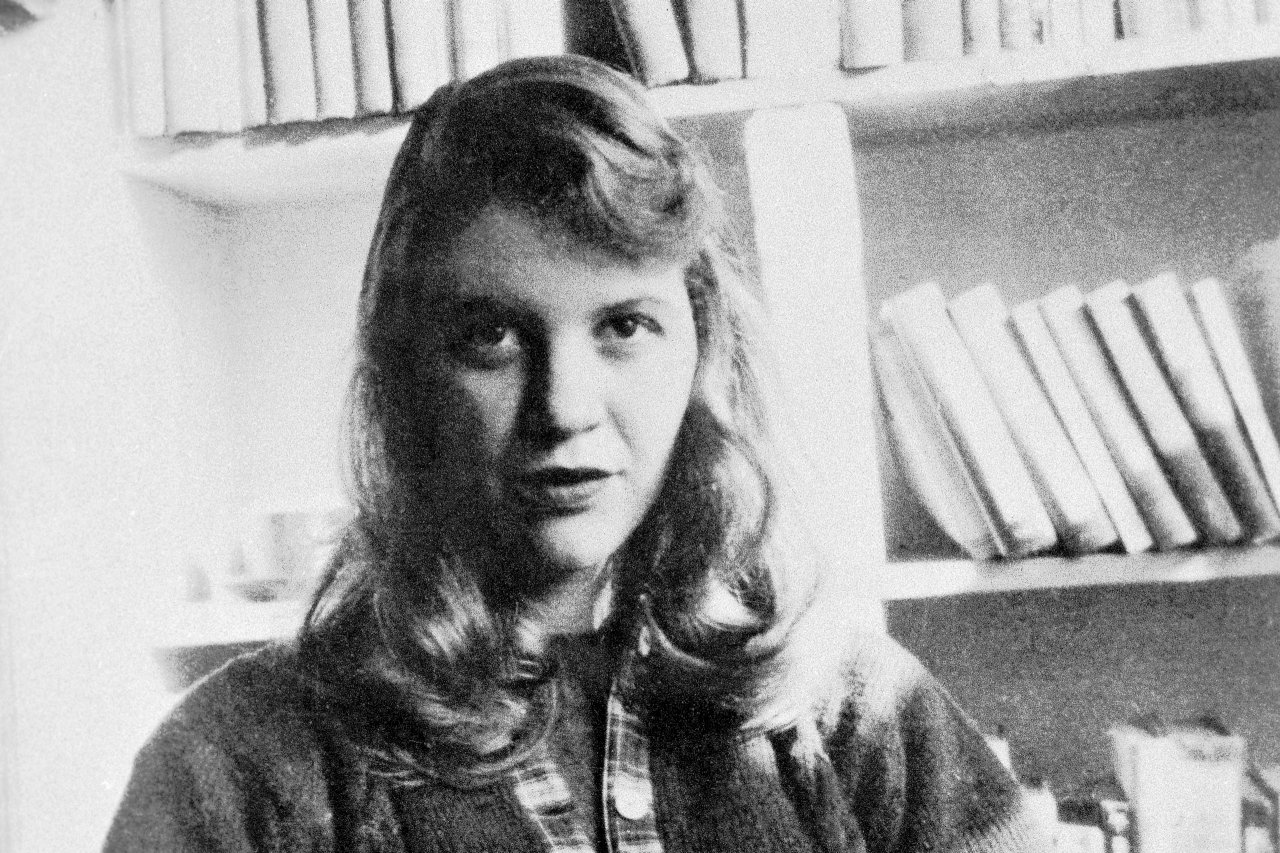Sylvia Plath, a
celebrated American poet from the mid-20th century, was known for
the dark complexity of her work—themes of death, loneliness, and suicide
preside in Plath’s poetry, and violent or disturbing images were commonplace. Plath’s
work is considered part of the Confessional school of poetry, a movement in
1950’s America that rebelled against midcentury suburban ideals and confronted
topics like personal trauma, mental illness, suicide, and sexuality. Her suicide at 30 cut short a promising
literary career—while her two young children were away (her husband had left
her for another woman a few months previous), Plath stuck her head in a gas
oven and turned it on. Her novel the Bell Jar and volumes of poetry Ariel and The Collected Poems would go on to earn her great critical acclaim
and the first posthumously-awarded Pulitzer Prize for poetry.
As was taught to me in high school, her poetry and prose were the extent of Plath's artistic expression. I was surprised to see her name on the spine of a book in the stacks underneath Lilly, and after flipping through the first few images had to double-check that I had read the cover correctly.
Her bold pen sketches remind me of nothing more than whimsical illustrations in a children's book. I love the unapologetic use of hard line and simple shading, which seem to be a constant in her drawings. I was frankly a little unsettled by the contrast between the dark rawness of her poetry and the innocence of her art--apparently Plath was devoted to visual art (pastels, painting, pen, etc) and was unsure whether to continue professionally or commit more fully to her writing until she was 20. Some critics contend that though it remained a comfort to her thought her life, her drawing never reflected the depths of her spirit the way her writing did and was instead as "polite and proper" as Plath was brought up to be in her well-to-do 1950's family.
Many of her drawings are quite bucolic-- some of the scenes wouldn't be out of place in a Constable exhibition. Indeed, while traveling with her husband she became so taken with a farm they visit that she wrote and underlined several times "must return to sketch cows again" in her journal. I am particularly surprised and impressed by the fanciful treatment of this cow's curly tail--the levity of her drawings recalls the (creepily) childlike rhyme schemes she juxtaposed with the frightening themes of her poetry. I shudder to think what a Plath children's book would be, but I would definitely like to look at the pictures.
Her botanicals are the darling of angsty twenty-something ink-seekers everywhere--if you google "Sylvia Plath flowers", you're equally likely to come up with poppy tattoos of dubious merit as Plath's actually sketches.
Her pieces are very crisp and very stylized, almost to the point of looking like woodblock prints. Discovering this more fanciful and light-hearted side of Plath has proven a fascinating counterpoint to what I thought I knew about one of America's greatest authors.
Ted Hughes, the unfaithful husband who would go on to become the poet laureate of England and eventually himself committed suicide, wrote a poem on Plath's art.
References
"Culling the Poetry Classics: Sylvia Plath." LitReactor. N.p., n.d. Web. 22 Feb. 2017.
Plath, Sylvia, and Frieda Hughes. Sylvia Plath: drawings. London: Faber and Faber, 2013. Print.
"Sylvia Plath." Poetry Foundation. Poetry Foundation, n.d. Web. 22 Feb. 2017. <https://www.poetryfoundation.org/poems-and-poets/poets/detail/sylvia-plath>.
Tmg. "Sylvia Plath drawings at The Mayor Gallery." The Telegraph. Telegraph Media Group, 25 Oct. 2011. Web. 22 Feb. 2017.
As was taught to me in high school, her poetry and prose were the extent of Plath's artistic expression. I was surprised to see her name on the spine of a book in the stacks underneath Lilly, and after flipping through the first few images had to double-check that I had read the cover correctly.
 |
| Citronnade Stand in Tuileries. Pen and ink on paper. |
 |
| Untitled (cow) |
Her botanicals are the darling of angsty twenty-something ink-seekers everywhere--if you google "Sylvia Plath flowers", you're equally likely to come up with poppy tattoos of dubious merit as Plath's actually sketches.
 |
| Meadow-Flowers |
 |
| Cow near Grantchester |
Ted Hughes, the unfaithful husband who would go on to become the poet laureate of England and eventually himself committed suicide, wrote a poem on Plath's art.
“Drawing calmed you. Your poker infernal pen
Was like a branding iron. Objects
Suffered into their new presence, tortured
Into final position. As you drew
I felt released, calm. Time opened
When you drew the market at Benidorm.
I sat near you, scribbling something.
Hours burned away. The stall-keepers
Kept coming to see you had them properly.
We sat on those steps in our rope-soles,
And were happy…”
—“Drawing"
References
"Culling the Poetry Classics: Sylvia Plath." LitReactor. N.p., n.d. Web. 22 Feb. 2017.
Plath, Sylvia, and Frieda Hughes. Sylvia Plath: drawings. London: Faber and Faber, 2013. Print.
"Sylvia Plath." Poetry Foundation. Poetry Foundation, n.d. Web. 22 Feb. 2017. <https://www.poetryfoundation.org/poems-and-poets/poets/detail/sylvia-plath>.
Tmg. "Sylvia Plath drawings at The Mayor Gallery." The Telegraph. Telegraph Media Group, 25 Oct. 2011. Web. 22 Feb. 2017.

No comments:
Post a Comment